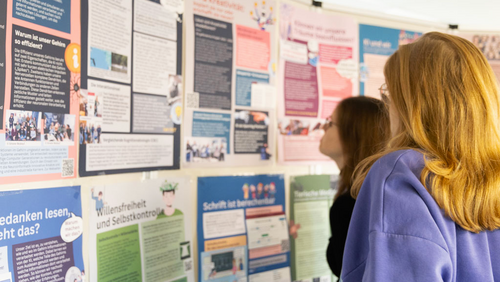Escape from the secret laboratory, prevent the zombie apocalypse - find your dream job? Escape rooms usually have a specific theme with tasks and puzzles that need to be solved. The Zukunftsregion Ems-Vechte now wants to develop new scenarios to make the various career opportunities in the local plastics industry tangible for school pupils. The project "Escape Room Settings in Vocational Orientation", or "ErinBO" for short, is being supported by the Lower Saxony Regional Development Ministry with around € 85,000 in EU funding. Regional Development Minister Wiebke Osigus has now handed over the funding decision.
Osnabrück University is providing scientific support for the project and is investigating the effectiveness of career guidance. The findings will help to further develop the method and possibly transfer it to other sectors.
Companies from the plastics industry are working together with schools and universities from Osnabrück to develop individual escape room scenarios that provide a practical and playful introduction to training occupations and processes in plastics processing.
Regional Development Minister Wiebke Osigus: "Projects like 'ErinBO' create new places of learning and are also real door openers to exciting careers. In the escape rooms, pupils can discover their talents in a different way and familiarize themselves with their future working life. The focus on local companies is particularly evident: The experts for Lower Saxony's regions are based locally, not in Berlin or Brussels."
Prof. Dr. Jochen Oltmer, Vice President for Studies and Teaching at Osnabrück University, praised the close cooperation between Osnabrück companies and schools, Osnabrück University of Applied Sciences and the university: "In close coordination, the partners develop learning settings that make it possible to experience real professions in plastics processing. In this way, they enable a lively encounter with the respective activities. Particularly in view of the shortage of skilled workers, this project is a strong sign that solutions can arise from ideas that are developed from the region for the region - supported by expertise, commitment and innovative spirit."
Background information: The "Future Regions of Lower Saxony" program provides around € 96 million from ERDF/ESF+ funds for the 14 future regions in Lower Saxony. When they were founded, these future regions were able to choose from the fields of action Regional Innovation Capacity, Low CO2 Society and Circular Economy, Biodiversity and Functioning Natural Spaces, Change in the World of Work, Social Equity and Social Participation, Healthcare and Care, and Culture and Leisure. The budget per region is between €5 million and €8 million. In addition, the "Future Regions of Lower Saxony" program will fund regional management until the end of funding in 2028.
Further information for the media:
Prof. Dr. Marco Beeken, Osnabrück University
School of Biology/Chemistry
marco.beeken@uos.de




